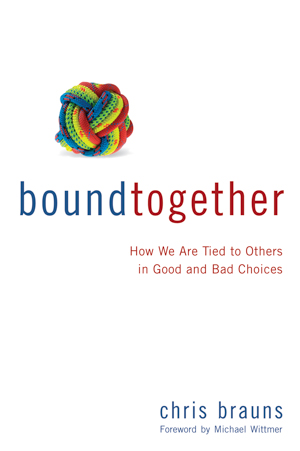This morning, TGC runs my review of the new book Bound Together by Chris Brauns. I think readers of HT will find the book highly valuable on wrestling with the issues of national and political identity theologically:
One of the strengths of Bound Together is the way it draws together scriptural passages, wisdom from great Christian thinkers, and the latest scholarly analyses of the issues. Brauns reads much like C. S. Lewis in that he’s widely versed in all these sources and modest enough not to have much desire to be original. He masterfully pulls together the right quotes and passages in just the right way to help others come into a knowledge of these issues…
Beginners will find this an invaluable introduction, and those who have already studied this topic will surely discover new insight.
The chapter on political and civic problems stemming from our failure to understand the human person as a social creature is quite good. It’s aimed at a lay audience, but even an old hand like myself found it beneficial.

You mentioned in your review, “Brauns doesn’t do much to flesh out this principle with language and concepts that might make the book intelligible to non-Christians.”
I was interested to know who do think does this well, either with the principle of being “bound together” or with any other biblical teaching?
Yikes, that’s a big question even if we just stick to the “bound together” principle. One classic source that I consistently direct people to is Peter Berger’s The Sacred Canopy. The first half of that book is an excellent introduction to 1) the social nature of humanity and 2) its intersection with religion, written entirely for academic sociologists and thus with zero “Christianese.” (The second half of the book, on “secularization,” can be disregarded – Berger later repudiated it, and rightly so.) A less academically dense source would be the relevant chapters of C.S. Lewis’s Mere Christianity and The Problem of Pain.
I am humbled by your interaction. I think it is fair critique.
In terms of other sources, I would agree with the recommendations that you give. In the Problem of Pain, Lewis wrote:
“. . . the separateness – – which we discern between individuals, is balanced, in absolute reality, by some kind of ‘interanimation’ of which we have no conception at all. It may be that the acts and sufferings of great archetypal individuals such as Adam and Christ are ours, not by legal fiction, metaphor, or casuality, but in some much deeper fashion. There is no question, of course, of individuals melting down into a kind of spiritual continuum such as Pantheistic systems believe in; that is excluded by the whole tenor of our faith. But there may be a tension between individuality and some other principle.”
The “some other principle” is what I attempted to write about in Bound Together.
In terms of thinking about solidarity / being bound together, “Bellah’s, Habits of the Heart,” is must reading. Of course, Bellah’s book does not have an evangelical agenda.
I agree whole-heartedly regarding Berger. Bork’s, Slouching Towards Gomorrah,” is also helpful. Here’s a quote:
“A fragmented society, one in which a sense of community has disappeared, is necessarily a society with low morale.”
Or, here’s another Bork quote:
“Egalitarianism necessarily presses us towards collectivism because a powerful state is required to suppress the differences that freedom produces. That raises the sinister and seemingly paradoxical possibility that radical individualism is the handmaiden of collectivist tyranny. This individualism, it is quite apparent in our time, attacks the authority of family, church, and private association. The family is said to be oppressive, the fount of our miseries. It is denied that the church may legitimately insist upon what it regards as moral behavior in its members. Private associations are routinely denied the autonomy to define their membership for themselves. The upshot is that these institutions, which stand between the state and the individual, are progressively weakened and their functions increasingly dictated or taken over by the state. The individual becomes less of a member of powerful private institutions and more a member of an unstructured mass that is vulnerable to the collectivist coercion of the state. Thus does radical individualism prepare the way for its opposite.”
You know who else is good on this? Tocqueville. That line about “radical individualism is the handmaiden of collectivist tyranny” made me think of it.
Yes! I agree with Tocquevillle.